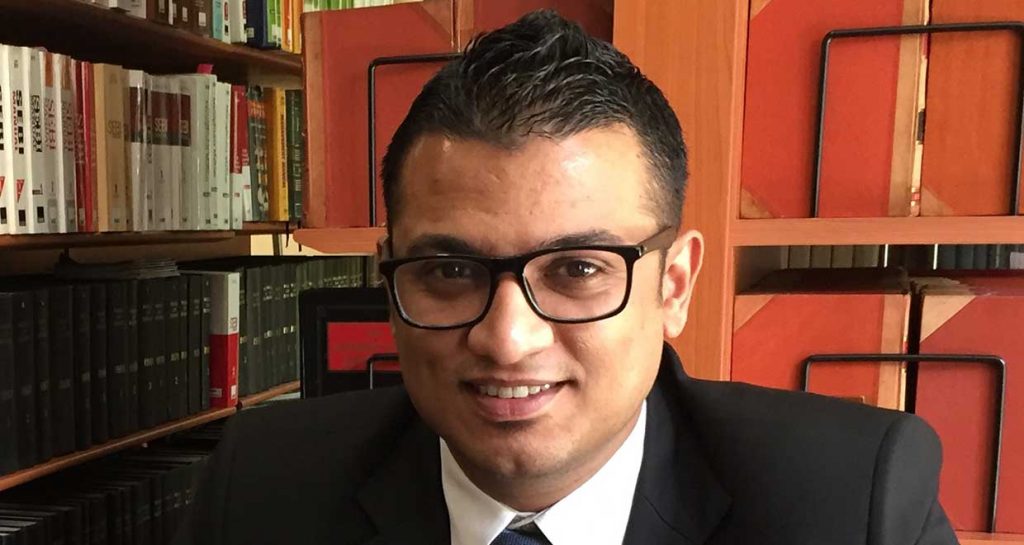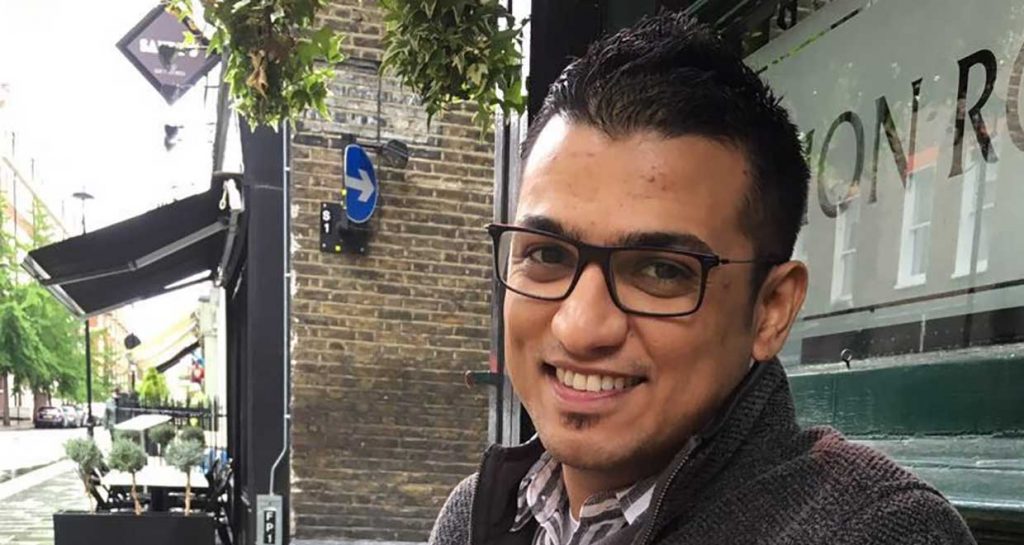Kuber Dewan graduated from Symbiosis Law School, Pune, in 2008. After a brief stint with Khaitan Sud & Partners [erstwhile Khaitan Jayakar Sud & Vohra (KJSV)], he moved to DMD Advocates (erstwhile Dutt & Menon), New Delhi, where he works in the capacity of Senior Associate. His primary practice area is dispute resolution-litigation. He has represented the firm’s clients across fora, which involved appearing in and arguing matters before Courts and Tribunals, research, drafting and drawing up pleadings, submissions, notices, briefing & assisting Senior Counsel and research.
In this interview we speak to him about:
- His time at Symbiosis
- His involvement in landmark cases
- His experience thus far
What would you like to say to our readers in the manner of an introduction of yourself?
I have been practising in New Delhi since July 2008 and have been engaged with DMD Advocates (formerly known as Dutt & Menon) since November 2008, where I am currently retained in the Dispute Resolution team. My role involves representing the firm’s clients in arbitrations and commercial litigations across fora.
Are you a first generation lawyer?
While I would not say that I come from a family of lawyers (my parents are not lawyers), I do have a fair number of lawyers in my family, each of whom has played a contributory role in my choosing law as a profession.

Tell us a bit about your college days at Symbiosis Law School, Pune.
Well, college days at Symbiosis and college days at Pune, while interrelated, are completely different and separate topics of discussion. Symbiosis had a course structure and execution thereof, which was unlike any other institution at the time, and the faculty was extremely supportive. No testimonial to Symbi is complete without special and specific mention to a couple of Professors who etched themselves in the memory of probably each and every one of my batchmates – one who took upon himself to introduce all of us to the creature known as The Law of Torts – calling upon each student by name, never making a mistake, never losing his temper – even at my tardiness in keeping to the time table as I was always late for his lecture, every single day (Torts was the first lecture of the day); the other, a practising lawyer, who took the time (and the pain) to explain, not teach (figure the difference) the concepts of the law of contracts. It was by reason of such institutions within an institution which made Symbi a great platform for legal education.
Pune on the other hand, was a forum where I was introduced to the myriad cultures of the country, in that I had the opportunity of meeting and befriending individuals who hailed from different parts, each carrying with them cultural nuances, which I had never been exposed to in my school years in Delhi. It was also the first step towards actually growing up. The lessons learnt aren’t available in paperback or otherwise – they flow from the experiences lived. The friends and acquaintances gathered, have to a large extent shaped me to be the person I am today.
Did you take part in co-curricular activities while in college?
Co-curricular activities are important in everyone’s life – not limited to a law student, I feel. That said, I have to confess that I was not very active with respect to co-curriculars in my college days. Barring participating in a singular moot court and two conferences organised by the college, I was not very active within the college – outside was a different story.
How did you make the decision between Litigation and Corporate practice?
To be honest, I did not know what people meant when they referred to “Corporate Lawyers” or “Corporate Practice” till I completed my first year. To my mind, the practice of law meant only that which involved studying in a chamber and appearing in court. Having learnt the distinction, the decision for me was a no-brainer, I had to get into the actual practice of law (no disrespect to corporate lawyers). While many may disagree and counter, my personal (and by no means popular and/or exhaustive opinion) is that the litigation practice is more dynamic and impactful, involving an incomprehensible number of variables and lastly is just down right exciting.
Could you tell us about the internships you took up, and what you learnt from those experiences?
I personally feel that internships are an extremely important part of a lawyers’ education. You can’t learn how to ride a bike by only reading about it can you? My initial internships were not participatory– I would merely shadow the lawyers whom I was training under; picking up tips & tricks along the way. Slightly smarter and better read, my internships during my third to fifth year, were where I had the opportunity of actually feeling like a lawyer – being knee deep in research and drafting (let’s not get too excited, they were just notes). Internships are a window into the profession. They may help a law student decide which field – litigation or corporate – they fancy and/or are better suited to.

What advice would you give students in avoiding a decision paralysis?
While further studies are never a bad option, it is a very individualistic choice – depending always on what direction a law student is looking to head in. It is therefore, in my view, important to first gather a year or two of experience in the profession before taking a call on whether or not to pursue further studies – be it an LLM, MBA or any other course. If a law student has the opportunity of pursuing further studies, that too overseas, the least s/he will take away from such a course would be experiences and insights of individuals from different parts of the world (or different ‘jurisdictions’ as lawyers would enjoy calling it) and develop a great network, which is invaluable for a lawyer, litigator or corporate.
What influenced your decision in taking up a position with Khaitan & Khaitan [formerly Khaitan Sud & Partners]?
The decision was a guided one.
What was the transition like, from a law student to a lawyer?
It’s not a transition – it’s a rude shock! From a happy-go-lucky attitude to suddenly waking up and smelling the coffee, quite literally. Initially it is a little tough to get your bearings, but you manage to settle in after a while. A whole lot of responsibility is thrust upon you all of a sudden, but you have to learn to cope with it – involves a little bit of growing up. The thrill of the first paycheck versus the monthly pocket money from home, lets you know that you have arrived.
Do you think it is important to have someone to look up to and guide you during the initial phase of your career?
Yes, but it is being betrayed by the roaring success that first-generation lawyers are achieving.
What was the nature of work you took up during your time at Khaitan & Khaitan?
Primarily research, miscellaneous/minor drafting, appearing before the Trial Courts, appearing before the High Court (seeking pass-overs and adjournments), assisting my seniors, senior counsel and the like.
Though I was there for a short time, I picked up a lot – the mentoring style was to throw you into the deep end – the surest and quickest way to learn; which is something I appreciate to date.
Tell us about your experience working at DMD Advocates?
Diverse. Rigorous. Founded by two very passionate and dedicated lawyers, Ms. Dutt and Ms. Menon, both of whom I credit for shaping me into the lawyer and the person I am today, have taken the firm from its humble beginnings to the high powered juggernaut that is DMD today. The dedication and passion towards each and every matter inspires the best out of everyone. The smallest of court cases or transactions receives the same kind of attention and importance as the highest stake ones. You learn to appreciate that no work is too small or unimportant. Client satisfaction is paramount. At DMD it’s not just about winning the prize, but also about learning and respecting the game.
The culture here is very unlike any other firm, where you are allocated into a particular team, ‘specializing’ in a particular area – at DMD, you are always in the ‘pool’ not settling into a particular stream or kind of work – the idea being that you should be a well-rounded lawyer – able to answer any query put up by a client. As a result of which I have had the opportunity to experience pretty much the A (Arbitration) to Z (Writs) of law, being involved in everything from Aviation cases, Arbitration & Commercial disputes, Consumer disputes, Tax matters, Mining matters to maritime & shipping related cases. Obviously, as you gain more experience and develop a skill-set associated with a particular field, you tend to lean more towards that particular field, which is appreciated and encouraged at DMD. The partners are always there to guide you, irrespective of seniority and the mentoring process is ongoing, at every level.
What are the challenges and learning opportunities that you were faced with in your career as an advocate?
No lawyer can ever claim to know everything. The practice of law is an ongoing education. Every brief, every case, every transaction, there is something new to learn. Each new case is a challenge. There is always a new question, a new issue, a new problem – if not new, it’s always different. You have to keep yourself abreast with the latest developments in law, constantly read up case law, familiarize yourself with commentaries, articles and publications. Attend seminars (or webinars, which are gaining popularity).
What does your role entail at DMD Advocates?
As a member of the Dispute Resolution practice at DMD, I am engaged with representing the diverse international & domestic clients of the firm in corporate commercial litigation and arbitration matters, across fora. The job entails drafting, research, engaging & assisting Senior Counsel, appearing before various judicial and arbitral forums including the Supreme Court of India.
As for my involvement in the arbitration practice at DMD, it has always been an area I have been keenly interested in. I enjoy reading case law dealing with the various aspects of arbitration. Commentaries are a great source for guidance. However, at the end of the day, there is no better teacher than experience. You learn something new and fortify earlier learnings, with every step forward that you take. I am also actively involved in the aviation practice of the firm – another area of interest – I mean, who isn’t fascinated with aeroplanes!
What does a typical working day look like for you?
My method of preparation for a hearing, whether I am to appear myself or assisting counsel, is pretty simple and straightforward – read the brief cover to cover, prepare notes, read and ready the case law, make notes. Making my own notes obviates the need to re-read the entire brief before every hearing – you cannot afford to waste time revising the entire matter before a hearing; quite often you have multiple matters listed before different courts, yet your time for preparation is limited. It is however extremely important to update your set of case law before every hearing. You do not want to end up citing a judgment that has been overruled. The research and case law are very important to your case. I was told very early in my career that, a lawyer who does not have/bother to carry judgments for the hearing, should not bother appearing.
Having appeared before the High Courts and the Supreme Court, could you share with us some interesting cases that you have worked on?
During my tenure at DMD I have had the great fortune of appearing in cases which have made their way into the law report (and at times, the headlines). The front runner being the Vodafone case against the Income Tax department [(2012) 6 SCC 613]. The preparation for the matter was, to say the least, very taxing. Other interesting cases, which have been reported are Arun Dev Upadhyay v. Integrated Sales Service Ltd. & Anr. (NP) [(2016) 9 SCC 524], Petromarine Products Ltd. v. Ocean Marine Services Co. Ltd. [(2015) 7 SCC 229], GE India Technology Centre Pvt. Ltd. v. Commissioner of Income Tax [(2010) 10 SCC 29], Safmarine Container Lines N.V. v. Amita Enterprises & Anr. [197 (2013) DLT 181], Naval Gent Maritime Limited v. Shivnath Rai Harnarain (I) Ltd. [174 (2009) DLT 391], A.K.G. Exim Pvt. Ltd. v. Efesan Demir Sanayi Ve Ticaret A.S. & Anr. [164 (2009) DLT 341] – covering diverse questions, ranging from maintainability of appeals, enforcement of arbitral awards, applicability and effect of the provisions of the Income Tax Act, 1961.
Other cases that I am currently involved with at DMD, involve questions of, inter alia, the setting aside of arbitral awards, the challenge to the enforceability of foreign awards in India, the interpretation of the provisions of the Multi-State Co-operative Societies Act, 2002, the interpretation of the provisions of the Electricity Act, 2003.
How do you manage your time between your professional and personal interests?
I enjoy watching movies in my free time – science fiction, thrillers, action and adventure are the broad genres. I find watching movies to be a great way to unwind after a days’ work. Unwinding is very important for a lawyer. You are constantly wired while you are at work, with a dozen and more thoughts running through your mind. When you leave the office, you need to leave it all behind – else you will lose your sanity!
Reading fiction used to be a habit that which I have now lost touch with. Reading is a very important habit that every young lawyer must develop. You could read fiction, non-fiction, pretty much anything that suits your fancy – after all, the profession requires copious amounts of reading.
Another interest I harbour is that in automobiles – be it ogling at and drooling over super cars, or just driving around; I find it to be a great way to relax (difficult to believe with Delhi traffic – but the right kind of tunes can take your mind off that).
Given the dynamic nature of the field you practice in, how do you keep yourself updated about the latest developments in the law?
Reading – case law, commentaries, newsletters, articles, blogs, pretty much anything one can get their hands on. I subscribe to weekly newsletters which provide the latest developments, legal reporting websites, which provide daily updates on the happenings in the profession and quite often also carry very informative articles published by respectable names.
What advice would you like to give our readers, who are mostly law students and young lawyers?
I will preach what I try to practice – read – case law, commentaries, newsletters, articles, blogs, pretty much anything you can get your hands on. Subscribe to weekly newsletters – todays’ technology has made information very easily accessible – there is no excuse for not being informed. While the trend today is to come up with on-the-spot research and answers, one should never forget that the learning and understanding to be gained from books, cannot be substituted by your favourite search engines.
If you are in law school, take your internships seriously – they are the windows to the world that you are planning to step into. Once you have entered the profession, you have to be prepared to make sacrifices. Your time will not be your own. Your life will not be your own. You have to develop & possess the dedication to put your profession before yourself.
That being said, remember the age old saying, work hard and party hard, Counsellor.
























